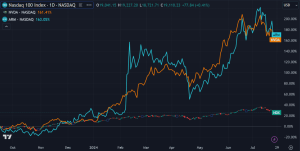Two of the most notable stock market crashes of the last century were in 1929 and 1987. Specifically, they were in October 1929 – and October 1987. I don’t think it’s a coincidence that both those major stock market crashes happened in October. Here I explain why, and what I think it means for me as an investor this October.
Market timing and the month of October
Many investors, including myself, think it is a fool’s errand to try and time the market precisely. If events were so predictable, the market wouldn’t function: it needs both buyers with sellers to make a market, after all.
But there are still some identifiable trends in stock movements based on time of year. Around Christmas, for example, price swings can be exaggerated due to thin volumes with many traders on holiday. Summer is often a sleepier season in the stock exchange, for the same reason.
October often marks the start of heightened commercial activity. At the start of the year, businesses have time to deliver on their annual plan. In the summer, demand slow downs and the lure of the beach can suck effort away in many industries. But by September, staff are back to work in force – and the clock is ticking to meet targets by the end of the year.
That’s true for businesses, and also for the banks who help fund them and organise stock deals. Economic and financial difficulties may bubble away unresolved over the summer. But as September moves into October, it’s often time for bold decisions and serious business to be done. That was clear in the timeline of the 1929 stock market crash.
The FTSE 100 has boomed since last October
Compared to this time last year, the FTSE 100 index of leading UK shares has increased 20%. It’s still around 10% below its all-time peak reached in May 2018, however (“sell in May” advises the old stock market adage). So we’re in territory we’ve been in before.
Compared to 2018, however, many businesses are now in worse shape. Balance sheets have been loaded with debt. Additional costs have arisen due to the pandemic and a creaking global supply chain.
On the other hand, monetary easing has helped support the market. Some companies now are doing better than they were before the pandemic, due to shifts in customer habits. From Greggs reporting interim pre-tax profits above 2019 levels to JD Sports delivering its best ever interim results, many businesses now look in stronger shape than they were previously.
So looking at fundamentals, I don’t see a clear story about whether a market crash is imminent. On top of that, employment figures are strong, the economy has reopened at pace, and many companies are performing very well.
The power of sentiment in a stock market crash
But a stock market crash isn’t just about fundamentals. Sentiment matters too.
Considering sentiment, I feel more nervous. Massive borrowing and loose monetary policy have made many investors nervous. Concerns around the possibility of an Evergrande debt default have echoes of 2007, when problems in obscure markets led to a much broader sell-off in global stock markets. There are also signs that loose monetary policy is ending, such as the Norwegian Central Bank raising interest rates.
I don’t know if this October will bring another stock market crash. But I do see reasons for concern that it might.
Inflation Is Coming: 3 Shares To Try And Hedge Against Rising Prices
Make no mistake… inflation is coming.
Some people are running scared, but there’s one thing we believe we should avoid doing at all costs when inflation hits… and that’s doing nothing.
Money that just sits in the bank can often lose value each and every year. But to savvy savers and investors, where to consider putting their money is the million-dollar question.
That’s why we’ve put together a brand-new special report that uncovers 3 of our top UK and US share ideas to try and best hedge against inflation…
…because no matter what the economy is doing, a savvy investor will want their money working for them, inflation or not!
Best of all, we’re giving this report away completely FREE today!
Simply click here, enter your email address, and we’ll send it to you right away.
Christopher Ruane has no position in any of the shares mentioned. The Motley Fool UK has no position in any of the shares mentioned. Views expressed on the companies mentioned in this article are those of the writer and therefore may differ from the official recommendations we make in our subscription services such as Share Advisor, Hidden Winners and Pro. Here at The Motley Fool we believe that considering a diverse range of insights makes us better investors.
This post was originally published on Motley Fool







